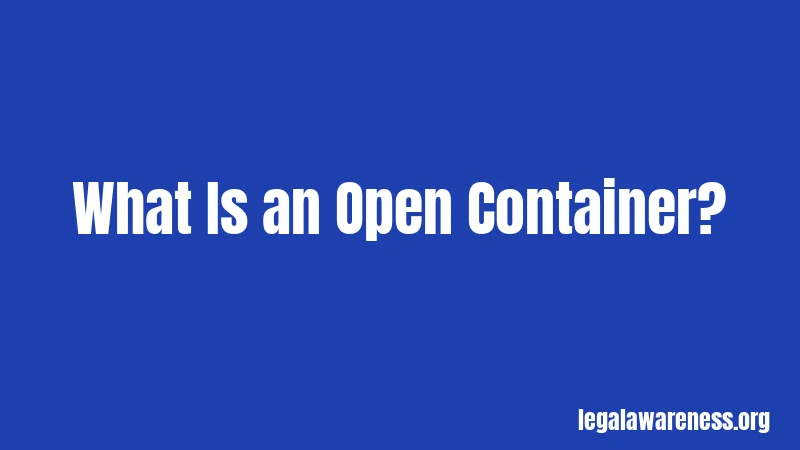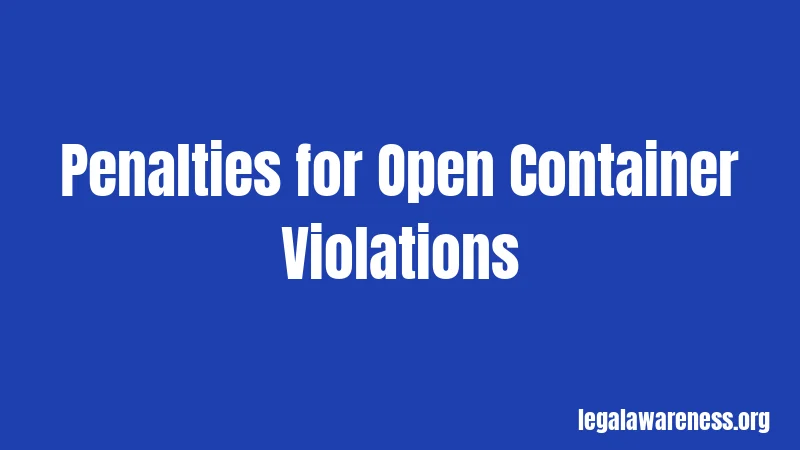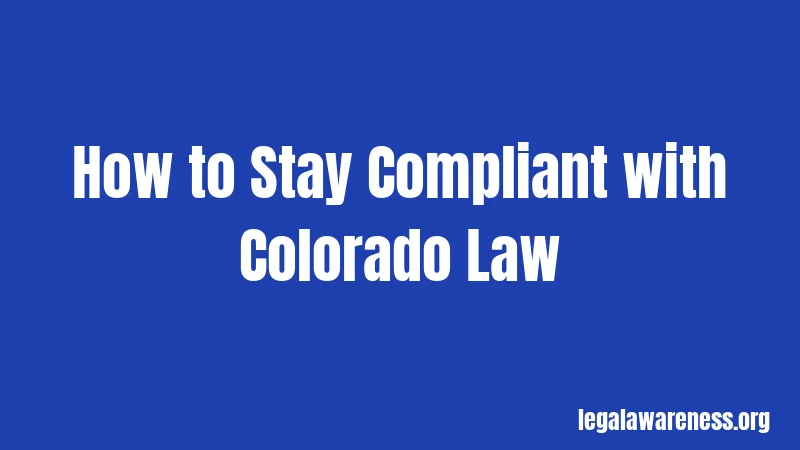Colorado Open Container Laws (2026): What Drivers Need to Know
You probably think you can keep a beer in your car as long as you’re not drinking it. Hold on. That’s actually not how it works in Colorado, and honestly, this surprises a lot of people.
Open container laws exist to keep our roads safer. They prevent drunk driving and make sure nobody’s tempted to drink while driving. Colorado takes these laws seriously. The penalties can hit your wallet and your driving record. Let’s break down exactly what you need to know.
What Is an Open Container?

An open container is basically any drink with alcohol in it that’s been opened, unsealed, or has visible liquid missing. Think of it like a can of beer with the tab pulled, a bottle with the cap off, or a glass with beer in it.
Here’s the important part: it doesn’t matter if you’re drinking it or not. It doesn’t matter if the alcohol is in the backseat and you’re sitting in the driver’s seat. Under Colorado law, simply having an open container in your vehicle is illegal. Yep, that’s all it takes.
Basic Open Container Laws in Colorado
What Counts as a Violation?
Colorado makes it illegal to have any open alcoholic beverage in a vehicle. This includes beer, wine, liquor, and even mixed drinks. The law is found in Colorado Revised Statute (CRS) 42-4-1305.
So what exactly is considered “open”? An open container is any bottle, can, or glass where the seal is broken. This includes drinks that have been partially consumed. A bottle with the top unscrewed counts. A beer with the tab pulled counts. A wine glass with liquid in it counts.
You might be wondering about sealed bottles. Good news: sealed alcohol is generally fine. You can have a case of beer in your trunk with the seals intact. You can transport wine bottles that have never been opened. As long as the container hasn’t been opened or consumed, you’re not breaking the law.
Where the Law Applies
This law applies inside any vehicle, period. It doesn’t matter if you’re driving on a highway or parked on the street. It doesn’t matter if the car is running or not. An open container sitting in a parked vehicle is still illegal.
Now here’s where it gets interesting. The law applies to all passengers, not just the driver. If your friend is sitting in the backseat holding an open beer, that’s a violation. The driver can be charged even if they’re not the one holding the drink. This is the part that surprises most people.
The law covers all types of vehicles too. Cars, trucks, motorcycles, RVs. If it’s a vehicle on a public road or parking lot, the open container law applies. Even vehicles parked in your driveway are technically covered, though enforcement there is rare.
Specific Rules You Need to Know
Wait, it gets a little more complex. The law specifically prohibits open containers “in the passenger area of a motor vehicle.” The passenger area includes the front seat, back seats, and the area where passengers sit.
Here’s the key difference: your trunk is not the passenger area. You can legally keep open alcohol in your trunk. Same with a locked glove compartment, technically. The logic makes sense. If it’s out of reach and hidden away, it’s not tempting the driver.
But honestly, this is the part most people miss. Many people think they can put an open beer anywhere in the car as long as they’re not drinking it. That’s wrong. It has to be completely out of the passenger area.
Penalties for Open Container Violations

So what happens if a police officer finds an open container in your car? The consequences are real, and they can affect more than just your wallet.
Fines and Citations
A first-time open container violation in Colorado is a traffic infraction. You’ll get a citation and a fine. The fine is typically around $130 to $250 for a first offense. Not huge, but not pocket change either.
The exact amount depends on the county and the specific circumstances. Denver might impose a slightly different fine than rural Colorado. But you’re looking at at least $100 to $300 range for most violations.
License Points
Here’s the part that really stings. An open container violation puts points on your driving record. In Colorado, you get four points added to your license. Accumulate too many points, and your license gets suspended.
Think of it like a traffic ticket, but the points add up faster than you’d think. If you already have violations on your record, this can push you over the limit. Honestly, this is worth taking seriously.
Insurance Impact
Don’t forget about insurance. This violation shows up on your driving record. Your insurance company can see it. That means your rates might go up. You’re not looking at a massive increase, but it could be $50 to $100+ per year depending on your insurance company.
Over five or ten years, that adds up. A $130 fine might turn into $500 to $1,000 in increased insurance costs. Worth keeping in mind.
Subsequent Violations
A second open container violation within five years is still a traffic infraction, but the penalties increase. You could face fines up to $300 to $500. The point penalty stays at four points.
A third violation within five years can be treated as a misdemeanor. Now you’re looking at potential jail time (up to 60 days), higher fines, and more serious consequences. This is where things stop being just a citation.
Special Situations and Exceptions
Not every situation is the same, and Colorado law recognizes some exceptions. Understanding these can save you from an expensive mistake.
The Rideshare Exception
Here’s some good news. If you’re a passenger in a rideshare vehicle (like an Uber or Lyft), open container laws may not apply the same way. Rideshare vehicles are considered commercial vehicles in some contexts.
That said, don’t push your luck. Just because you’re a passenger doesn’t mean you should test the boundaries. Some officers might still cite you. The safest approach is always to avoid open containers in any vehicle.
Private Property Exception
What about a vehicle parked on private property? Technically, the law states vehicles must be on a public road or parking lot. But here’s the catch: many parking lots are considered public or semi-public.
Your driveway is private property. A vehicle parked in your driveway while you’re not driving it is technically legal for open containers. But the moment you drive that vehicle anywhere, it’s illegal.
This exception is rarely tested in court, honestly. It’s not worth the risk. Just follow the general rule and avoid open containers whenever you’re in a vehicle that might move.
Special Event Zones
Some Colorado cities have established special event zones where rules might be different. During certain festivals or events, some areas allow open containers outside of vehicles.
But inside vehicles? The rule stays the same. Even in special event zones, you cannot have open alcohol in the passenger area of a vehicle. Don’t assume exceptions apply just because there’s a concert or festival happening.
How to Stay Compliant with Colorado Law

Okay, so here’s what you need to actually do to avoid this whole situation.
Before You Drive
Keep all alcohol sealed and unopened if you’re transporting it. This is the simplest rule. If it’s sealed, you’re safe.
Check your car before you leave. Make sure no passengers are holding open drinks. Make sure there are no open containers in the cup holders or seat pockets. A quick glance around takes 10 seconds.
If you’re planning to drink, don’t drive. This should go without saying, but it’s the best solution. Have a designated driver or use a rideshare. It’s cheaper than a fine and infinitely safer.
At Parties and Events
If you’re at a party or event and plan to drink, arrange transportation before you start drinking. Call a friend, use Uber, call a taxi. Make these arrangements when you’re sober, not after.
If someone offers you a ride home and they’ve been drinking, say no. Offer to drive instead. Take an Uber. Stay over. Do anything except get in the car with an impaired driver.
Transporting Alcohol
When you buy alcohol to take home, keep everything in sealed containers. Keep it in your trunk if possible. Never leave open alcohol unattended in a vehicle, even for a few minutes.
If you’re bringing wine to a dinner party, keep it sealed until you arrive. If you’re bringing beer to a picnic, keep the cooler closed while driving.
Frequently Asked Questions
Can I drink while parked if the car is off?
No. Colorado law prohibits open containers in vehicles regardless of whether the car is running. Parked or moving, running or off, it doesn’t matter. The law is clear: no open alcohol in the passenger area.
What if I’m in the backseat?
Still illegal. Passengers are subject to the same rules as drivers. The law applies to anyone in the vehicle, not just whoever’s behind the wheel.
Can I have an open container in an RV or camper?
Not in the passenger area or driving area. Some RVs have sleeping quarters physically separated from the driver’s area. Those might be okay, but the driving cab is not. Check your specific RV configuration and local laws to be safe.
Do I need to worry about sealed bottles in my trunk?
No. Sealed, unopened alcohol in your trunk is completely legal. Transport as much as you want as long as it’s sealed and in the trunk.
What should I do if I get pulled over and I have open alcohol in my car?
First, don’t panic. Stay calm and respectful. Be honest with the officer. Have your license and registration ready. Admit the violation if there is one, and cooperate with the citation process.
Final Thoughts
Colorado’s open container laws are straightforward once you understand them. No open alcohol in the passenger area of any vehicle, period. Sealed bottles in the trunk are fine.
This law exists for good reasons. It keeps roads safer. It prevents drunk driving. It protects everyone.
Stay informed, follow the rules, and use common sense. When in doubt, keep the alcohol sealed and in the trunk. It’s the safest approach, and it keeps you out of legal trouble.
Now you know what you need to know. Drive safe out there.
References
Colorado Revised Statutes 42-4-1305 (Open Container Law)
Colorado Department of Transportation: Open Container Laws
